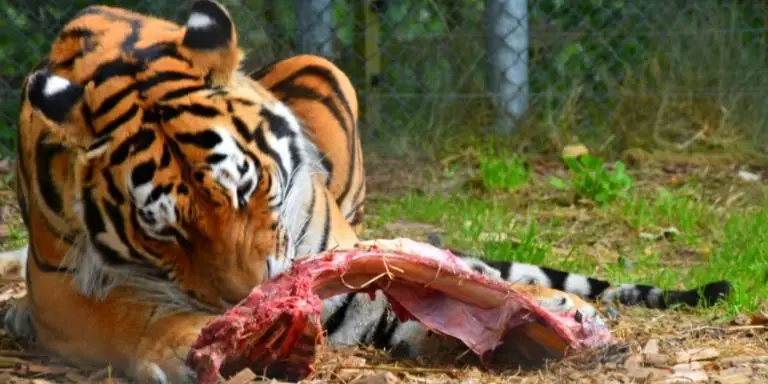Tigers have a diverse diet. Their appetite is massive, and they have a robust digestive system. They are carnivores and mainly like meat and fat. Tigers have a powerful acidic stomach for dissolving such heavy food with intense calories. However, do tigers eat bones?
Tigers regularly eat bones in the wild but can also eat human bones. This is not only beneficial for their physical health and growth but also beneficial for their dental health.

Do Tigers Chew on Bones?
Tigers like to eat bones. In the wild, a tiger can eat up to 19 pounds daily, including meat, fat, and bones. They usually eat about once a week.
Although in captivity, their diet changes a little. Tigers are fed by humans. If the tiger keepers are unaware of the tigers’ diet and nutrition, it might lead the animal to some deficiency.
Hence, Tigers must be given various diet items for their proper health and growth. With various meat and fat, they must also be provided with bones and fish at times. This would ensure their proper health.
4 Health Benefits of Eating Bones

There are several beneficial sides to the tiger of chewing bones. It is natural to them. They do this often in the wild and should also be allowed to chew bones in captivity.
- When tigers digest bones, they digest them in such a ratio that is perfect for the growth and maintenance of their joints and bones. Whereas eating only chunks of meat reverses the ratio. Hence, it might be crucial to growing tigers if they don’t get enough meat with bones. Sometimes the young growing tigers can develop a disease called rickets. It is a disease developed when the Calcium to Phosphorus ratio is deficient. Older tigers can have Arthritis, joint pain, and soft bones. This can lead them to lameness.
- Moreover, eating bones keep Tiger’s teeth strong and healthy. Without eating bones, their teeth and gum might be attacked with diseases like Tartar. This can lead to blood clotting in their gums and losing the sharpness of the teeth. As a result, the teeth can fall off, which will not allow them to get enough food and nutrition. This lack of nutrition will ultimately affect their health and lead to premature death.
- Eating bones and carcasses take their ultimate health in a better condition. It would also change their diet, and they can get off boredom and monotonous eating habits.
- Bones can also provide them with necessary vitamins to help the growing tiger become stronger and healthier.
Tigers Digesting Bones
The digestive system of the tiger is divided into:
- The stomach
- The small and large intestines and
- The caecum.
The whole digestion process starts with the mouth. The tiger chews and swallows the bones. The bolus then travels to the stomach. The stomach is small in size compared to the tiger’s body.
However, even a small stomach is enough for them as their diet mainly comprises meat, fat, and bones. The inside of the stomach is filled with a concentrated solution of hydrochloric acid.
The acid is so strong that it starts to digest the food before it is even swallowed. The digestion of a tiger can take hours. However, the stomach only digests a small part of the food.
Most of the digestion happens in the small and the large intestines. The small intestine is where the food is broken into even smaller pieces into the basic components and mixed with the bloodstream.
The remaining food items then travel to the large intestine. Here it is further broken into smaller pieces. The large intestine mainly extracts water and compacts the rest of the waste into a small mass. The final wastes are stored in the rectum and finally leave the body through the anus.
Conclusion
Tigers like to eat until their stomach is full. Do tigers eat bones? Yes, undoubtedly. Their strong digestive system has no problem breaking down the raw bone parts.
However, cooked bones should not be given to them as the bones get splintered inside their mouth. Splintered bones have sharp edges that could cause them harm and wound them from the inside.
You might also be interested in:
